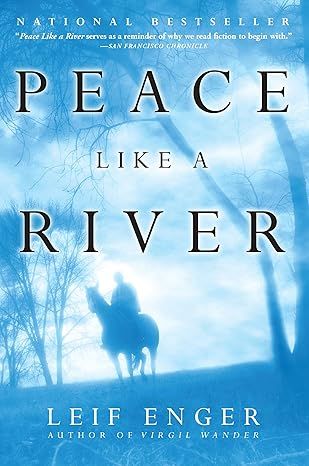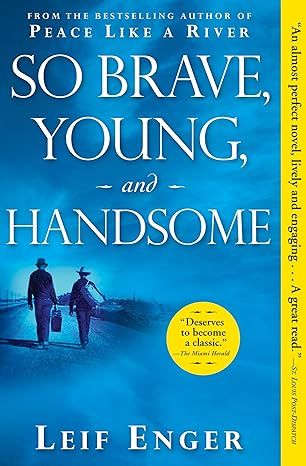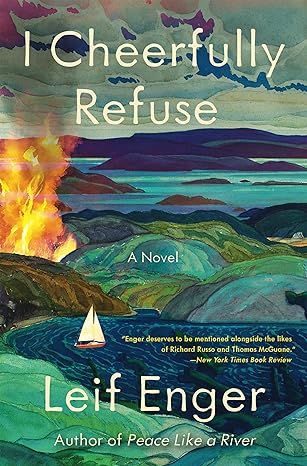Peace Like a River: A Novel
4.4 out of 5
5,951 global ratings
A “reminder of why we read fiction to begin with” (San Francisco Chronicle), Peace Like a River is Leif Enger’s extraordinary debut novel—a heroic quest, a tragedy, a love story, and a haunting meditation on the possibility of magic in the everyday world—with over one million copies sold
Raised on tales of cowboys and pirates, eleven-year-old Reuben Land has little doubt that miracles happen all around us, and that it’s up to us to “make of it what we will.” Reuben was born with no air in his lungs, and it was only when his father, Jeremiah, picked him up and commanded him to breathe that his lungs filled. Reuben struggles with debilitating asthma from then on, making him a boy who knows firsthand that life is a gift, and also one who suspects that his father is touched by God and can overturn the laws of nature.
The quiet Midwestern life of the Lands is upended when Davy, the oldest son, kills two marauders who have come to harm the family; unlike his father, he is not content to leave all matters of justice in God’s hands. The morning of his sentencing, Davy–a hero to some, a cold-blooded murderer to others–escapes from his cell, and the Lands set out in search of him. Their journey is touched by serendipity and the kindness of strangers–among them a free spirit named Roxanna, who offers them a place to stay during a blizzard and winds up providing them with something far more permanent. Meanwhile, a federal agent is trailing the Lands, convinced they know of Davy’s whereabouts.
With Jeremiah at the helm, the family covers territory far more extraordinary than even the Badlands where they search for Davy from their Airstream trailer. Sprinkled with playful nods to biblical tales, beloved classics such as Huckleberry Finn, the adventure stories of Robert Louis Stevenson, and the westerns of Zane Grey, Peace Like a River unfolds like a revelation.
320 pages,
Kindle
Audiobook
Hardcover
Paperback
Audio CD
First published November 30, 2007
ISBN 9780802139252
About the authors
Leif Enger
Leif Enger worked as a reporter and producer for Minnesota Public Radio for nearly twenty years before leaving to write fiction full-time. He lives in Minnesota with his wife Robin.
Reviews
Kathryn Egly
5
A touching and inspiring story
Reviewed in the United States on June 20, 2024
Verified Purchase
This is a beautifully written, heartfelt novel that blends adventure, faith, and family into an unforgettable story.
At its heart, "Peace Like a River" is about the power of family and faith. It explores how these forces can guide us through the darkest times and bring hope and healing. The Land family’s love for each other and their unwavering belief in miracles provide a touching and uplifting message. The characters are richly developed and relatable, each with their own quirks and strengths.
Leif Enger’s storytelling is powerful. I recommend this book to anyone who appreciates a touching and inspiring story.
Read more
6 people found this helpful
Bruce J. Wasser
5
majestic hymn to family strength, faith, personal integrity
Reviewed in the United States on October 11, 2002
Verified Purchase
Leif Enger's stunning debut novel, "Peace like a River," is part hymn, part epic myth and part lament to an American past in which individual virtue and steadfastness of faith elevate men and women. Enger has described a world of faith, one in which an asthmatic child savors religious truth, tangible miracles and ironclad trust in a father whose love for his children is eclipsed only by his devotion to his God. The characters who populate "Peace" become living symbols while at the same time gracefully engaging us in their physical, moral and spiritual struggles. The physical environment of this bighearted novel is uninviting. Wintry Minnesota and North Dakota provide appropriate physical challenges to the Land family, which must adapt to a crucial decision made by the oldest son Davy. That decision, to pursue a violent, but just, resolution to two miscreants who terrorize the Land family, compels Davy to flee and the remnants of his family to pursue. This quest, both temporal and spiritual, is the heart of the novel, and the author probes themes of family coherence, justice, truth, redemption, and faith with quiet, perfect timbre. Enger is a magnificent writer, whose narrative abilities alone make "Peace" worth reading. However, it is his characterization of the Land family which transforms his novel. The narrator, Reuben Land, an eleven-year-old asthmatic boy, defines our perspective and never permits his adult recollections of the events of his childhood to interfere with an authentic, often painful, recounting of his participation in the central action of the novel, the discovery of his "outlaw" brother. While Reuben discounts his own ability to understand and interpret events, he never underestimates the talents of his sister, Swede, who emereges as an enormously sympathetic young woman. It is Swede's penchant for poetry, symbolism and subtelty that enriches our understanding of the enormous pressures and conflicts the children experience basking in the presence and shivering in the shadow of their father. Much like the novel, Jeremiah Land has a "foundation...laid in prayer and sorrow." Through Swede's eyes, he emerges as either a full-blown Homeric hero or the living embodiment of a champion of justice of the Old West. Readers will recognize his afflictions as similar to Job, and Jeremiah gains stature as he is seemingly purified by God's many painful tests of his faith. From the onset of the novel, readers glimpse the impossible occurring through Jeremiah's intervention. He literally breathes life into his newborn son; he survives a tornado; during prayer, he walks on air. These miracles pale in comparison to the one he hopes to achieve with and through his family as they search for Davy. A major triumph of the novel is Enger's unwillingness to permit his writing to become predicatable or saccharine. Instead the bulk of the novel forces readers to either suspend their own disbelief or submerge their own skepticism. In a moving afterword, Leif Enger pays homage to his father, who "believes in vivid narration," and his mother, "who writes better letters than anyone since the Apostle Paul." The author is a living representation of the values he extols in his parents. "Peace like a River" deserves the widest audience. Its unabashed belief in the integrity of the human spirit, its bighearted acceptance of the possibility of miracles and its loving evocation of family love and truth intermingle. This is a novel worth reading, savoring and sharing.
Read more
11 people found this helpful
tonilpayne
5
Soul-stirring, inspirational, and beautiful!
Reviewed in the United States on January 4, 2014
Verified Purchase
The title of Enger’s fictitious story of a family who follows the oldest brother, Davy Land, a wanted criminal, into the Badlands of North Dakota is just as much about how the reader will feel reading his beautiful and gentle prose as it is about the story itself. Peace Like a River is a soul-stirring novel of familial love and bold, determined faith. While other novels may provide warmth like an electric heater, Enger’s novel is more like sitting in front of a blazing fire and feeling the warmth all the way down to your bones – it gets inside you. Whether the warmth of the beloved Land family themselves or the warmth of the tenderness and love shared between them, Enger’s story is capable of warming a heart to believe.
How rare it is to fall in love with characters from the very beginning of the book! The Land family are the kind of beloved characters that are so convincing I sometimes lose sight of the fact that I can’t drive up to North Dakota and see them again. I found myself praying for them, only to suddenly remember how illogical that was. I tell you, they are that precious! What I wouldn’t give to hear Swede tell me one of her western stories (I’ve always loved westerns myself), or to kick around with the noble Reuben Land, or to be inspired by the faith of Jeremiah. Despite the desperation of their circumstances and the tragedy woven throughout the story, the love and loyalty they show each other will certainly make them timeless characters in what is sure to become a classic novel along the same lines as To Kill a Mockingbird or Dostoevsky’s The Idiot.
The power of Peace Like a River is in its witness to the presence of an almighty and loving God as well as the purpose and reward of faith in Him. There are miracles throughout the story and, “real miracles bother people, like strange and sudden pains unknown in medical literature. It’s true: They rebut every rule all we good citizens take comfort in.” God’s presence is not only evident in the overt miracles, but also in the way He directs their path, comforts their hearts, and provides for their needs. Reuben Land is a faithful witness to the hand of God in all of it, “we are all in the hand of God.” The prayer life of Jeremiah Land is also an excellent example of God’s presence. Jeremiah, like Jacob of old, ”wrestles” with God in prayer, and is physically and spiritually humbled to obedience.
Reuben Land is a witness to the miracles that “flowed from my father’s fingertips,” but Reuben is also witness to the faithful devotion of his father to God, and the story is led on in the same direction of Jeremiah Land’s faith in God’s leading of him, “Faith brought this about. Faith, as Dad saw it had delivered unto us the Airstream trailer, and faith would direct our travels.” Jeremiah’s faith is slowly transferred to Reuben and culminates at the end of the story in a chapter similar to CS Lewis’s ending in The Last Battle. The redemptive beauty of Jeremiah’s faith and its final reward are the most powerful elements in the story.
Whether you enjoy a story with a captivating plot, beautiful prose, or memorable characters, or one with theological depth and profound wisdom you will be thoroughly satisfied by Leif Enger’s Peace Like a River. You will read, be warmed, and be filled. The best stories inspire us to believe, and Enger’s story of faith and love attains to that lofty goal.
Read more
12 people found this helpful
CSL
5
A fantastic read.
Reviewed in the United States on May 27, 2024
Verified Purchase
Gripping story with great characters. Enter creates a amazing scenes. Almost is good is his recent, I Cheerfully Refuse (and I loved that).
L. Quido
5
The Minnesota "tall tale" gets a modern twist....
Reviewed in the United States on February 11, 2004
Verified Purchase
Leif Enger becomes a lightning rod for praise and blame in "Peace Like A River". Judging just from the reviews on this site, you can either wax rhapsodic about his tale, or just view it as contemporary claptrap. Leif Enger, in his first novel, couldn't be more Minnesotan. Raised on Minnesota farm, he lives as an adult on a farm in a quintessential small town of the hinterland, with his wife and children. For most of his adult career, prior to the release of "Peace Like a River" he worked for Minnesota Public Radio (which also begat Garrison Keillor). Like Keillor, Enger looks for beauty in the simple way of life around him, and roots it in the family. But other comparisons do no justice to either man. So, too, has Enger's novel been compared to "To Kill a Mockingbird", mostly because the narration is through the eyes of a child, who is telling the story as an adult. Symbolism and the discovery of one's parents' true nature are themes for Enger, as much as they were for Lee. But Enger does strike out into new territory with "Peace Like a River" -- he captures the charm and folk wisdom of the Minnesota "tall tale", and sets it in a relatively contemporary setting - 1962 in the heartland. More successful at weaving Christian mysticism and the appearance of miracles into his narrative than say, contemporary writers such as Dean Koontz, Leif Enger brings a true talent for rich prose and unsettling questions to his tale. Synopsis of the plot: Born an asthmatic, Reuben Land's first miraculous event was finally beginning to breathe after several minutes of stillness, when his father, Jeremiah, orders him to breathe in the name of the living God. Reuben is raised by his father, with older brother Davy and younger sister Swede. Abandoned at a young age by their mother, Reuben and his siblings grow up in a way that many children who feel abandoned do - they develop skills and thoughts far more mature than is normal for their age. In this family, most of the precociousness is drawn in 9-year old Swede, who commands language and vocabulary far above that of most adults. Swede's interest in all things western form the story's backdrop, as she writes lyric poetry with a larger than life character, Sunny Sundown. From Reuben's point of view, his early life, is as a spectator, watching his dad perform miracles and overturn the laws of nature. It is left to the reader to divine whether the miracles do occur, or are just what they are in the viewpoint of a small boy who witnesses over and over how Jeremiah pulls his family together with faith and love. In a search for Reuben's older brother, Jeremiah confronts obstacles and seemingly performs feats which make the obstacles disappear. Are they really miracles, or do they feel as such to a scared, eleven year-old boy? It is evident that Jeremiah's strong belief in God and his ability to connect to God to protect and provide for his family are the driving force behind the Land family's ability to find Davy, and to find comfort in the circle of a woman named Roxanna. In the tale, Enger also draws a villain named `Jape', like Koontz's villains, almost a caricature of Satan. What comes to prevent the most tragic of fates, and lends a remarkable conclusion to the tale, is best left to the reader to pursue. Enger adds rich texture to the tale by the quality of his prose. He can invoke memories from me of the land and the beauty and fear of a child when coming of age. His faith is simple and strong, and from it he envisions the miracles that Jeremiah performs to keep his family together. Forces of nature (blizzards, fires) conspire to give you the feeling that you are truly being transported to the wild west, a land where people need to come to terms with how to live around what nature puts in their path. And, like Harper Lee, Enger is able to get inside the mind of a child, and put forth a child's vision and wishes into contemporary terms as they focus their desires through toys and activities. Less of an adventure story than a tale to reinforce the value of a strong family, I think Enger's novel is somewhat miraculous in and of itself, a surprising journey into emotions you felt as a child, and have since forgotten. It feels as though there is at least some of the autobiographical in Enger's novel. Read it, delight in it!
Read more
39 people found this helpful
joelandanna
5
A book I love so much I have shared over and over.
Reviewed in the United States on January 23, 2024
Verified Purchase
I am an avid and eclectic reader, and this is one of my very favorite books. Leif Enger takes his time and brings forth a beautiful story with rich characters and writing that is even better on re-reading. Jeremiah Land lives his life according to a different story. He is a true hero armed with joy, patience, life, and healing rather than physical strength used to bring harm. There are so many layers, and I love experiencing it all through the lens of the flawed and humble witness, Ruben. I could go on and on. This is a book that makes me want to write, which, after reading this review, you may think a dangerous and ill-advised undertaking. Beautiful prose, rich characters, and a life-giving story, a book I have loved and shared over and over.
Read more
11 people found this helpful

A. Sutono, a.k.a., Birdey The Observer
4
Grace Abounding Amid Harsh Realities of Life
Reviewed in the United States on January 10, 2010
Verified Purchase
There are at least two groups of people I suspect would not enjoy Leif Enger's "Peace Like a River"; the non-religious and the cessationist Christians (those who believe in the cessation of the extra-ordinary gifts of the Holy Spirit at the end of the apostolic age including the miraculous gifts). But I personally love it with a reservation. Enger brilliantly describes the manifold of harsh realities of life, all too familiar to many of us. The book is some sort of a life journal through the eyes of an ashmatic Reuben Land since his miraculous survival at birth until his father died, though he talks a little bit about what happened afterwards in the end. The story is centered around the search for Reuben's fugitive brother, Davy, charged with the murder of two bad characters from his high-school when they broke into his house. The two were also guilty in two previous encounters involving the Land family; an attempted rape of Davy's girlfriend and the kidnapping of Davy's little sister Swede. Though the shooting dead of Israel Finch can be justified as an act of self-defense, the murder of Tommy Basca can not. I hope Enger does not intend to convey the message that Davy did the right thing when he killed a defenseless Tommy execution style. Thus, in my view, Davy is still guilty of murder. His lack of remorse; even after his imprisonment and escape from jail, and Enger appearing to portrait him as a hero bothers me as well.
On the other hand, I was thoroughly blessed by the multiple accounts of the faithful providence of God, specifically through miraculous events in the life of the Land family. It is agonizing to read about an unemployed hard-working single father Jeremiah Land, left by his materialistic wife, struggling with his own illness, unfairly fired by a wicked superintendent at his children's school where he worked as a janitor, and having to care for his three young children. It is painful to go through the account of an 11-year-old Reuben Land having to work construction to provide the family with something to eat everyday while his dad was recovering. It is heart-wrenching to be informed about two little children Reuben and Swede having to endure freezing cold weather as they traveled with their dad like vagabonds looking for their brother. Yet it is a joy to read about a godly prayerful father Jeremiah Land, faithful to God even when living in the depth of poverty, who clearly brought his children up in "nurture and admonition of the Lord." It is a pleasure to learn about the miraculous interventions of God to care for his children in addition to his more usual ways of working through means, yet regardless, fulfilling his promise that He would never leave them nor forsake them. Ruben might be right when he said there were no miracles since his family met Roxanna, but he forgot the fact their path crossing Roxanna's itself was a gracious act of God. It ought to excite a praiseful gratitude considering the kind of blessings he, Swede and their dad received through her. It is a pleasant experience to be acquainted with Swede, Reuben's little sister; a smart funny little girl, highly talented in western literature and poetry, betraying a hidden longing for a warm loving care of a mother, serving as a de-facto mother of the family, though it all changed after meeting and living with Roxanna, who eventually became her stepmother.
I have to give credit to Pastor John Piper who recommends this book. I have to agree with him. It was and has been a happy reading; a novel whose story I sense would linger with me for a long time.
Read more
21 people found this helpful
Grandma L
4
my granny read
Reviewed in the United States on June 23, 2024
Verified Purchase
Didn’t think I’d like it, but l kept wanting to see what happened next. A bit wordy, but well worth the read.
K. Sellin
4
Great adventure story
Reviewed in the United States on February 1, 2024
Verified Purchase
One star off for senseless killing of animals. 😥
Rube lives with his family in Minnesota - his single father, Jeremiah, his older brother Davy, and little sister Swede. (The mom took off for greener, or more golden pastures long ago.) They are just making do and getting by, when a tragedy strikes, and Davy goes on the run. Soon the rest of the family is out on the road, living day to day, hoping to find Davy, till they land at the home of Roxanna, in North Dakota. Rube and Swede experience motherly warmth and stability for the first time they can remember and wish they didn't have to leave...
Read more
3 people found this helpful
Amazon Customer
3
Not for me.
Reviewed in the United States on September 11, 2023
Verified Purchase
Too many rambling unbelievable side stories. The author is a good writer, but the story didn't flow. I skipped a lot of that and mainly read the relevant parts. I would not recommend.
5 people found this helpful
Top Leif Enger titles
Best Sellers

The Tuscan Child
4.2
-
100,022
$8.39

The Thursday Murder Club: A Novel (A Thursday Murder Club Mystery)
4.3
-
155,575
$6.33

Sapiens: A Brief History of Humankind
4.6
-
140,302
$13.49

The Butterfly Garden (The Collector, 1)
4.3
-
88,556
$9.59

Things We Hide from the Light (Knockemout Series, 2)
4.4
-
94,890
$11.66

The Last Thing He Told Me: A Novel
4.3
-
154,085
$2.99

The Perfect Marriage: A Completely Gripping Psychological Suspense
4.3
-
143,196
$9.47

The Coworker
4.1
-
80,003
$13.48

First Lie Wins: A Novel (Random House Large Print)
4.3
-
54,062
$14.99

Mile High (Windy City Series Book 1)
4.4
-
59,745
$16.19

Layla
4.2
-
107,613
$8.99

The Locked Door
4.4
-
94,673
$8.53



